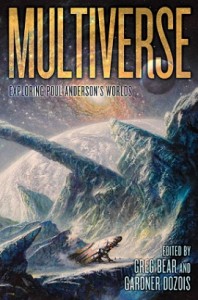From the remarkable people at Subterranean Press, news about a vast anthology in the worlds of grandmaster sf writer Poul Anderson. Multiverse contains stories by writers like Greg Bear, Nancy Kress, Gregory Benford, and many others. Currently available as a pre-order, it will be available in limited and trade editions.
Author: Anders Monsen (Page 19 of 83)
With surveillance ever-present and opponents of war and worse turning into that which they once opposed (a la Animal Farm), and our dear leader learning to love Big Brother, it is no wonder that sales of George Orwell’s dystopian future are spiking. A variety of sites have jumped on the meme of huge sales spikes for 1984, and it seems Obama’s legacy will be tightly linked to Orwell’s fiction.
One week after the death of Jack Vance, another towering giant in the sf world passed away. Iain M. Banks was only 59 years old when he died in June 9. He had been diagnosed with inoperable cancer only a few months prior, and knew his time was marked and short.
I’ve mainly read his Culture and other sf books, all under the Iain M. Banks name, rather than his Iain Banks literary fiction. His two most memorable books are Feersum Endjinn and Player of Games, and while at times his penchant for twist endings seemed contrived, everything prior to his endings stood out as an example of superb writing and dazzling imagination at furious work. Time, I think, to look for his non-sf books and mourn his loss by celebrating his fiction.
While out of the country recently I learned that Jack Vance passed away on May 26. Though Vance was in his late nineties, I almost expected him to live forever. Words cannot begin to describe the effect and influence his writing has had on my appreciation of fiction in general and the sf/fantasy genre. I read my first Vance story when I was nineteen, and no other write before or since has meant as much to me as Jack Vance. Elsewhere I will write my tribute in full. The world of genre fiction is far gloomier place without him.
Learned today that the sequel to Michael Shea’s novel, The Extra, entitled Assault on Sunrise, will be published in August of 2013. I’m thrilled to learn of a new book from one of my favorite authors, and hopefully this also means he’ll be writing some more short fiction soon.
And not the pirated kind, but audio readings, from Huxley, Asimov, and others. The original link has more information.
Over at Washington Times a review of The Bull, a novel by Matthew Weber. I’m planning a review of this book in Prometheus, along with a stack of other books I need to get through.
Quotes from Ray Bradbury and 25 minutes of audio of the late great master of speculative fiction.
Interesting article on how to use Google for country and file specific searches, somewhat like an un-named spy agency. Adding keywords like “site” and “filetype” aren’t new, but since most people use Google, knowing these and other ways to refine searches can improve other searches.
Thoughts on writing in letters from Raymond Chandler.